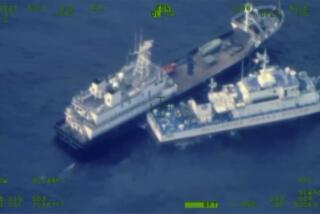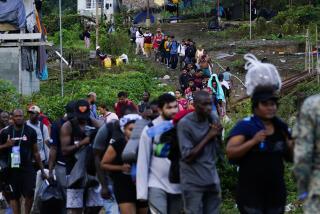Naval Plan, Peru Incident Strain Latin Ties, U.S. Says : Diplomacy: Hemisphere leaders are assured that events do not signal increased American aggressiveness.
WASHINGTON â The proposed deployment of Navy warships off Colombia has further strained inter-American relations and complicated the drug war, the Bush Administration acknowledged Tuesday.
At the same time, U.S. relations with Peru suffered a strain after U.S. troops surrounded a Peruvian diplomatâs residence in Panama City.
State Department spokeswoman Margaret Tutwiler said U.S. officials are providing assurances to Latin American leaders that the two incidents do not signal an increased U.S. aggressiveness in the wake of last monthâs invasion of Panama.
She said that a team of U.S. representatives will arrive in Colombia on Friday to participate in planning sessions for a scheduled Western Hemisphere drug summit on Feb. 15, and it appeared that Colombia, Bolivia and Peru still would participate as planned.
The government of Peru said Tuesday that it has granted diplomatic asylum to five Panamanian army officers and seven family members and has officially protested the posting of U.S. troops near the home of Peruâs ambassador to Panama.
U.S. authorities ordered the posting of 10 U.S. soldiers there Monday after receiving information that Lt. Col. Luis Cordoba, a police chief under deposed Panamanian dictator Manual A. Noriega, had taken refuge in the residence. Peruvian officials deny Cordoba is there.
Diplomatic sources said Peru has asked Panama to provide safe conduct for the 12 asylum seekers, who sought refuge in the ambassadorâs house after Noriega was ousted in the Dec. 20 U.S. invasion.
The five officers include senior military aides to the deposed strongman and Noriegaâs personal secretary. Panamaâs Foreign Minister Julio Linares said they will be granted safe passage if no criminal charges are pending.
U.S. officials, meanwhile, said their plans to deploy two naval vessels on drug-fighting duty off Colombia have been placed on hold and will not be pursued without the concurrence of the Bogota government.
Administration officials had said the aircraft carrier John F. Kennedy and the nuclear-powered cruiser Virginia left Norfolk, Va., last Thursday headed for international waters off Colombia on an assignment to monitor and intercept drug shipments.
But disclosure of the deployment plans caused a furor in Colombia, where the action was characterized as an American âblockade,â and the U.S. government said the two ships instead will be conducting âroutine operationsâ off Florida.
Tutwiler acknowledged that the incident at the Peruvian residence in Panama and the aborted deployment of the two ships had further strained already tense relations with Latin American leaders who objected to the U.S. invasion of Panama.
But she rejected suggestions that the Peruvian and Colombian concerns have become major problems, saying only that they had âcomplicatedâ diplomatic consultations.
âAll of our ambassadors who are on the ground, all our political officers, all our embassy personnel, (Assistant Secretary of State for Latin America) Bernie Aronson and all our staff here, sure, theyâre working in this region to assure them,â she said.
Tutwiler repeated President Bushâs statement that the Panamanian invasion was not a pattern for future U.S. action in the region.
Even so, she refused to rule out the use of warships in the U.S. campaign against international drug trafficking. She said Defense Secretary Dick Cheney has not yet recommended to the President a final plan of action for Colombia.
Tutwiler blamed the Colombian concerns on âmisinformationâ about U.S. plans to use warships to intercept drug traffickers off the coast of that country, the source of much of the worldâs cocaine supply.
Planning sessions for the drug summit begin today in Santa Cruz, Bolivia, with meetings of Bolivian, Peruvian and Colombian delegates. U.S. representatives will join the discussions Friday. The four-nation summit will be held next month in Cartagena, Colombia.
More to Read
Sign up for Essential California
The most important California stories and recommendations in your inbox every morning.
You may occasionally receive promotional content from the Los Angeles Times.










